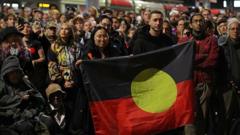In a tense Oval Office meeting, South African President Cyril Ramaphosa attempted to sidestep President Trump's unfounded claims of white genocide, but the diplomatic engagement may have left South Africa facing greater challenges in U.S. relations and trade.
South Africa's Diplomatic Challenge: Navigating Trump’s Controversial Remarks

South Africa's Diplomatic Challenge: Navigating Trump’s Controversial Remarks
A recent Oval Office meeting between South Africa's President Ramaphosa and President Trump reveals the complex intersections of diplomacy, misinformation, and political agendas.
In a high-stakes encounter in the Oval Office this week, South African President Cyril Ramaphosa sought to reset relations with the Trump administration amidst growing tensions surrounding controversial claims made by President Trump regarding white genocide in South Africa. The intent of the meeting was clear: to avoid focus on Trump's inflammatory rhetoric while fostering discussions around trade and economic cooperation.
Leading up to the meeting, Ramaphosa prepared meticulously to create a rapport, utilizing humor and goodwill gestures to lighten the mood. He even shared a thoughtful gift, a book, and expressed gratitude to Trump for providing crucial medical supplies during the COVID-19 pandemic. However, the carefully laid diplomatic groundwork quickly unraveled.
Despite efforts to navigate around the contentious issue, the conversation inevitably touched upon Trump's statements, worsening the dynamics between the two leaders. South Africa's delegation, striving to move on to topics like tariffs and mineral trade, found itself ill-prepared for the depth of Trump's emotional engagement on racial issues. Critics noted that while South African officials aimed to deflect from the topic, the lack of a strong rebuttal may have inadvertently emboldened the narrative propagated by Trump and his supporters.
Post-meeting analysis revealed that Ramaphosa left without tangible outcomes, now confronted with the prospect of heightened tariffs and no new trade agreements. Patrick Gaspard, a former U.S. ambassador to South Africa, remarked that this encounter could potentially worsen the plight of impoverished South Africans, intensifying economic divisions amid a backdrop of social strife.
With South Africa grappling with both the implications of Trump's rhetoric and its potential fallout, the diplomatic relationship faces a critical juncture, prompting questions about racial representation, economic injustices, and the future of U.S.-South Africa ties. As the dust settles on this dramatic meeting, it remains to be seen how both nations will recalibrate their approach moving forward in the realm of international diplomacy and trade relations.



















